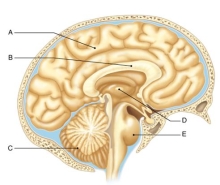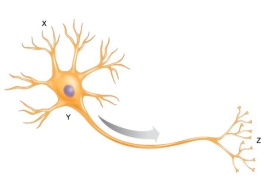A) parasympathetic division
B) autonomic nervous system
C) somatic system
D) sympathetic division
E) brain stem
G) A) and E)
Correct Answer

verified
Correct Answer
verified
Multiple Choice
Gaps in the myelin sheath are termed
A) nodes of Ranvier.
B) interaxons.
C) ganglia.
D) nuclei.
E) synapses.
G) A) and B)
Correct Answer

verified
Correct Answer
verified
Multiple Choice
Which ion needs to be pumped to the exterior of the axon in order to generate a nerve impulse?
A) Na+
B) K+
C) Ca+
D) H+
E) Cl-
G) B) and E)
Correct Answer

verified
Correct Answer
verified
Multiple Choice
Which of these works by inhibiting dopamine reuptake into synapses?
A) cocaine
B) THC tetrahydrocannabinol)
C) heroin
D) marijuana
E) all drugs of abuse
G) None of the above
Correct Answer

verified
Correct Answer
verified
Multiple Choice
Which of these structures is the pons? 
A) A
B) B
C) C
D) D
E) E
G) B) and D)
Correct Answer

verified
E
Correct Answer
verified
Multiple Choice
Which of these is mismatched?
A) diencephalon - thalamus
B) brain stem - medulla oblongata
C) cerebral cortex - occipital lobe
D) cerebellum - midbrain
E) frontal lobe - prefrontal area
G) D) and E)
Correct Answer

verified
Correct Answer
verified
Multiple Choice
Which of these is a second messenger?
A) cAMP
B) ATP
C) a peptide hormone
D) a steroid hormone
E) DNA
G) C) and E)
Correct Answer

verified
Correct Answer
verified
Multiple Choice
Your teenage son comes home late on Friday night and is acting strange. His behavior includes the following characteristics: high agitation, violent behavior, and irritability. These traits are far different from his normal behavior. As a parent you suspect he may have taken a drug. Which drug did he most likely take?
A) cocaine
B) methamphetamine
C) marijuana
D) alcohol
E) crack
G) B) and D)
Correct Answer

verified
Correct Answer
verified
Multiple Choice
The arrow shows the direction of the nerve impulse in a neuron. Where is the neurotransmitter released from the neuron?

A) axon
B) dendrite
C) cell body
D) myelin sheath
E) axon terminal
G) B) and C)
Correct Answer

verified
Correct Answer
verified
Multiple Choice
Weight gain, diabetes mellitus, and a moon-shaped face may indicate
A) Addison disease.
B) Graves disease.
C) simple goiter.
D) pituitary dwarfism.
E) Cushing syndrome.
G) A) and C)
Correct Answer

verified
Correct Answer
verified
Multiple Choice
If you eat a jelly donut, your pancreatic islets will respond by secreting
A) growth hormone.
B) glucagon.
C) epinephrine.
D) insulin.
E) oxytocin.
G) A) and E)
Correct Answer

verified
Correct Answer
verified
Multiple Choice
Long, myelinated nerve fibers are called _____ in the PNS and _____ in the CNS.
A) tracts; nuclei
B) nerves; ganglia
C) ganglia; nuclei
D) nerves; tracts
E) ganglia; tracts
G) D) and E)
Correct Answer

verified
Correct Answer
verified
Multiple Choice
Following a severe head injury, a patient has uncontrollable, unfocused feelings of rage. What has most likely been damaged?
A) medulla oblongata
B) limbic system
C) pineal gland
D) primary motor area
E) cerebellum
G) B) and C)
Correct Answer

verified
B
Correct Answer
verified
Multiple Choice
People who are under constant stress have a tendency to gain weight, especially in the midsection, even if they do not overeat. This is because the hypothalamus responds to the stress by stimulating the
A) posterior pituitary.
B) adrenal cortex.
C) thyroid.
D) adrenal medulla.
E) pancreas.
G) A) and C)
Correct Answer

verified
Correct Answer
verified
Multiple Choice
You aren't normally aware of ongoing sensory stimulation, such as the touch of clothing on your skin. What part of your brain is responsible for this "filtering" of sensory input?
A) hypothalamus
B) medulla oblongata
C) cerebral cortex
D) cerebellum
E) thalamus
G) A) and E)
Correct Answer

verified
Correct Answer
verified
Multiple Choice
You are relaxing, having a snack and watching TV, when suddenly the entire house begins to shake violently. The activity of your _____ quickly decreases, while that of your _____ increases.
A) somatic nervous system; autonomic nervous system
B) autonomic nervous system; somatic nervous system
C) sympathetic division; parasympathetic division
D) sympathetic division; somatic nervous system
E) parasympathetic division; sympathetic division
G) B) and C)
Correct Answer

verified
E
Correct Answer
verified
Multiple Choice
If a neuron receives both excitatory and inhibitory signals, will an action potential be generated?
A) No, because any inhibitory signals will cancel out the excitatory signals.
B) Yes, but the action potential will be much smaller than if only excitatory signals were received.
C) It depends; if more excitatory than inhibitory signals are received, then an action potential may result.
D) Yes, because excitatory signals always stimulate an action potential.
E) It depends; if more inhibitory than excitatory signals are received, then the neuron will be free to produce an action potential.
G) A) and B)
Correct Answer

verified
Correct Answer
verified
Multiple Choice
A nerve impulse travels down a myelinated axon by
A) repolarization.
B) saltatory conduction.
C) simple diffusion.
D) integration.
E) summation.
G) All of the above
Correct Answer

verified
Correct Answer
verified
Multiple Choice
A spinal nerve contains
A) axons of sensory neurons only.
B) myelinated axons only.
C) axons of motor neurons only.
D) dendrites only.
E) both sensory and motor axons.
G) B) and C)
Correct Answer

verified
Correct Answer
verified
Multiple Choice
Dendrites
A) are usually the longest nerve fibers.
B) are covered with a myelin sheath.
C) receive signals from sensory receptors or other neurons.
D) generate nerve impulses.
E) are longer and less numerous than axons.
G) A) and C)
Correct Answer

verified
Correct Answer
verified
Showing 1 - 20 of 54
Related Exams